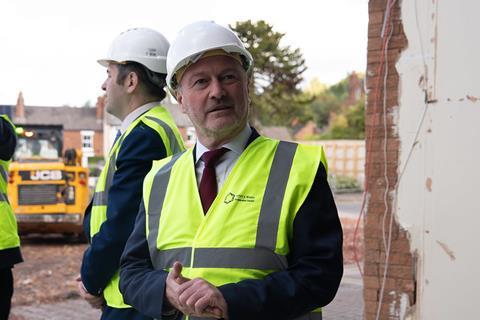Ministers to be given new powers to stop councils refusing planning permission while they consider using ‘call-in’ powers
The government will table a series of last-minute amendments to its flagship Planning and Infrastructure Bill in a bid to “tackle blockers” and kickstart construction.
The Ministry for Housing, Communities and Local Government (MHCLG) said the proposals announced today “could stop councils rejecting planning permissions, tackle blockers in the courts, alongside plans to accelerate reservoirs, windfarms and large housing schemes”.
Under the latest proposals ministers will be able to issue ‘holding directions’ to stop councils refusing planning permission while they consider using their “call in” powers. Currently they can only issue these holds when a council is set to approve an application.

A spokesperson said: “This will ensure ministers can properly use their call-in powers where necessary to boost growth and build more homes.”
The updated bill, which returns to the House of Lords next Monday, will also propose measures designed to stop planning permissions from being timed out for approved major housing schemes facing lengthy judicial reviews. This is in addition to plans to cut the number of times infrastructure projects can be challenged in court from three to one and a proposal to slash a year off the statutory pre-consultation period.
The MHCLG said it would speed up the approvals for large reservoirs by enabling non-water sector companies to build reservoirs that are automatically considered as nationally significant infrastructure projects. It also pledged to unlock more onshore windfarms and allow the new Nature Restoration Fund to support the delivery of marine development, which it said would accelerate the construction of coastal projects.
>> See also: Now is not the time to panic about low planning approvals
Natural England’s role will be streamlined, which MHCLG says will “speed up approvals for new homes and infrastructure by reducing unnecessary duplication”. It said this would allow “greater discretion to focus on applications that pose higher risks or present stronger opportunities for nature recovery”, with standard guidance provided to local authorities for straightforward cases.
The government, which has a manifesto pledge to build 1.5 million homes by the end of the parliament, is keen to kickstart construction activity as official figures showing a slow down in applications for new schemes. The number of planning applications has slumped to its lowest level in 20 years, while the 221,000 homes granted permission last year is the lowest in a decade.
Steve Reed, housing secretary, said the country’s potential has been “shackled by governments unwilling to overhaul the stubborn planning system that has erected barriers to building at every turn”.
Anticipating criticism of the reduction in Natural England’s role, Reed said: “It is simply not true that nature has to lose for economic growth to succeed.”
He said: “The changes we are making today will strengthen the seismic shift already underway through our landmark bill.
“We will ‘Build, baby, build’ with 1.5 million new homes and communities that working people desperately want and need.”


























1 Readers' comment